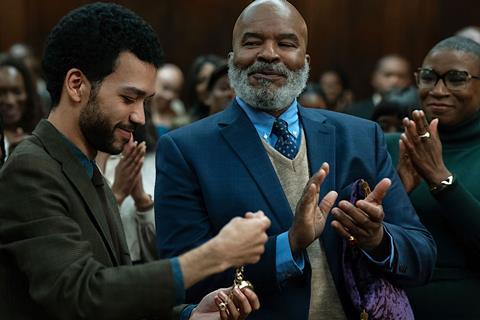A secret Black society works to make white people’s lives easier in this subversive satire

Dir/scr: Kobi Libii. US. 2024. 104mins
“The happier they are, the safer we are,” Aren (Justice Smith) is told. He is in the process of being recruited by Roger (David Alan Grier) to be a member of the titular mysterious society, whose job is “fighting white discomfort” at all costs. The title draws on the term coined by Spike Lee to describe the longstanding trope of Black film characters who exist only to serve a white protagonist’s story, such as those in The Legend of Bagger Vance and The Green Mile. But even though debut writer/director Kobi Libii sets out his stall in the most in-your-face way possible, there is a lot of subtlety at work in this funny and surprisingly romantic satire.
Satisfying and slyly subversive
Developed partially via both the directors and screenwriters labs at the Sundance Institute, the film is showing in the festival’s Premieres strand. Focus Features will release it in the US on March 15, and it is set to open in the UK on April 26. The sweetness that underlies the comedy, coupled with its likeable characters and the fact it only grows smarter in retrospect, should help it work a fair bit of box office magic.
Success is something Aren can only dream of. An artist, he makes sculptures out of yarn but fades into the background at exhibitions where we see him facing microaggressions from the white attendees – including being mistaken for the waiter. When the older Roger appears, he tells Aren his sort self-effacing attitude is precisely the credential he needs for a job at his Society. One secret door in a barber’s shop later, and the younger man is introduced to the Society’s wood-pannelled world.
Lovingly and meticulously designed by Laura Fox, this part of the film fully embraces fantasy. The Society’s head DeDe (Nicole Byer) levitates, and oil lamps create clouds of smoke to reveal successful “magical negroes” at work in situations which deliberately recall real-life filmic examples of the trope. The only rule is that you must always put “the client’s” desires above your own. On Aren’s way to his first assignment, the real world snaps sharply back into focus via a spilled coffee meet-cute with a young woman called Lizzie (An-Li Bogan, who brings a sunnyside-up openness to her character).
On turning up at MeetBox, the tech firm where Aren’s real job is to secretly help Jason (Drew Tarver), a white dude whose over-confidence far outweighs his abilities, he discovers Lizzie is also working there. Just as things seem to be heading in a kissable direction, Jason decides that, in addition to wanting to be successful at the firm, he also wants to date Lizzie — leading Aren to question his own actions even more. The choice isn’t straightforward, however, as breaking the Society’s rules comes with personal consequences.
Libii is not interested in making Jason an out-and-out villain, even if he is appallingly casually racist and sexist. And though much of what he says stems from a lifetime of enablement and ignorance, Kibii shows the impact on those around him is no less harmful. There is a horror to Aren’s dawning realisation that he was already big in the enabling business, and is now pushing it to the limit. At several points, Libii also zones in on the way that even when white characters are being told home truths, they usually are not listening. A sharp contrast, of course, to the way white characters absorb sage advice in traditional ’magical negro’ films.
The rom-com wrapper of Libii’s debut might initially appear to be softening the satire in comparison to the likes of fellow Sundance alumni Sorry To Bother You, but there is a lot more knitted into his film’s fabric. Knitting, indeed, plays a physical role, from the yarn of Aren’s creations to the soft, non-threatening knitwear that he wears most of the time and which even Lizzie, in one of the film’s most clever moves, begins to sport. The ending is simultaneously satisfying and slyly subversive, allowing an unravelling of ideas that should lead audiences to think about what they have watched.
Production companies: Focus Features, Sight Unseen, Juba Lane
Worldwide distribution: Universal
Producers: Julia Lebedev, Eddie Vaisman, Angel Lopez, Kobi Libbi
Cinematography: Doug Emmett
Production design: Laura Fox
Editing: Brian Olds
Music: Michael Abels
Main cast: Justice Smith, David Alan Grier, An-Li Bogan, Drew Tarver, Rupert Friend, Nicole Byer
























